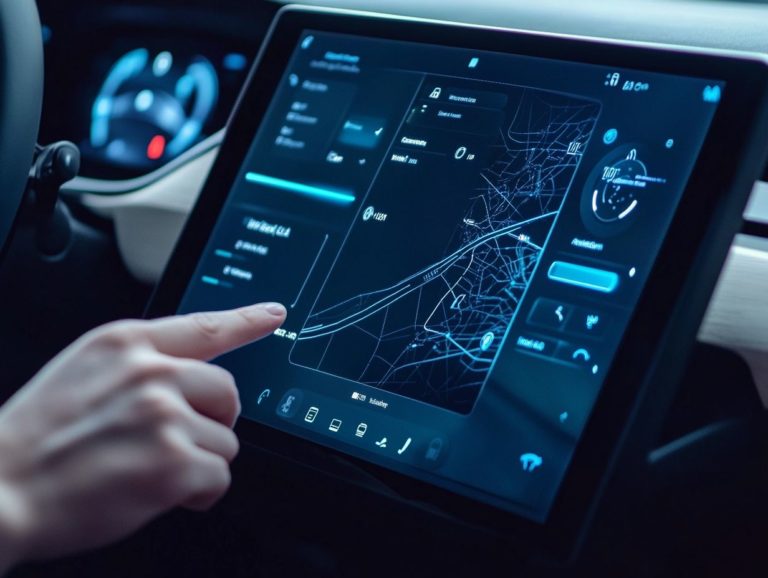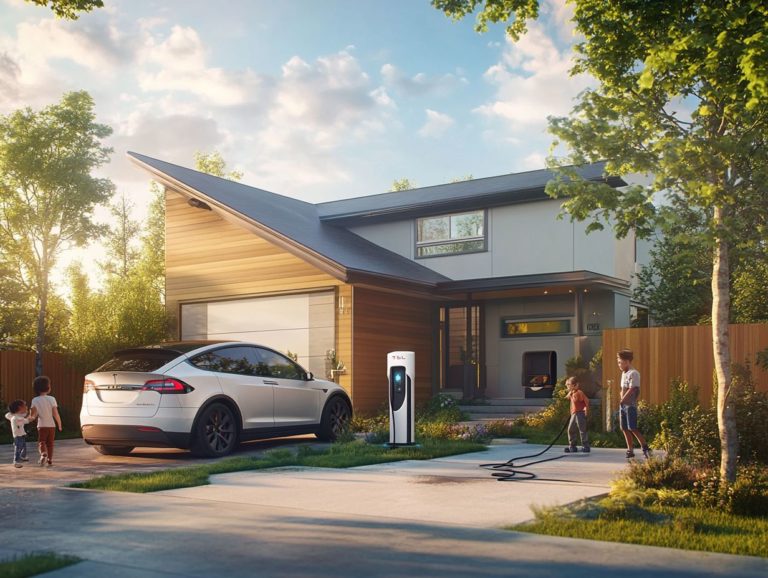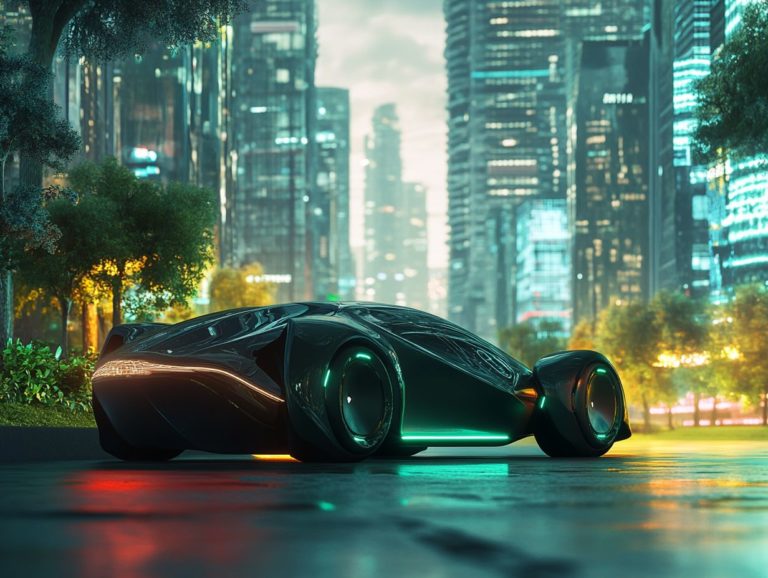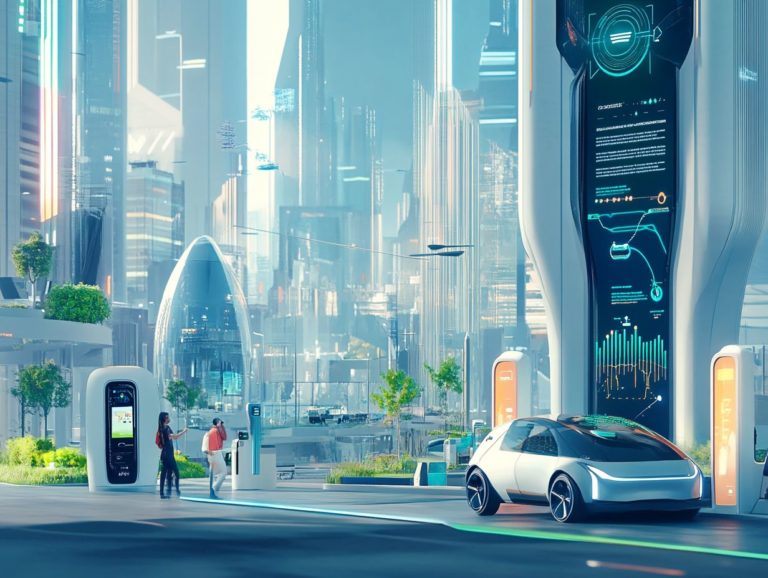72. the future of electric vehicle technology
Electric vehicles (EVs) have truly transformed from mere concepts into essential components of today s transportation landscape.
This article delves into the numerous benefits of EVs, showcasing their environmental and economic advantages. You ll gain insights into the current state of battery technology and charging infrastructure. Additionally, you will learn about the challenges that hinder widespread adoption.
As you explore the exciting advancements on the horizon, you’ll discover how these innovations promise to elevate your driving experience and seamlessly integrate with renewable energy sources.
Embark on this journey through the dynamic world of electric vehicles and see how they are shaping the future of mobility!
Contents
- Key Takeaways:
- The Evolution of Electric Vehicles
- Benefits of Electric Vehicles
- Current State of Electric Vehicle Technology
- Future Developments in Electric Vehicle Technology
- Challenges and Roadblocks to Electric Vehicle Adoption
- Frequently Asked Questions
- What is the current state of electric vehicle technology?
- What are some key advancements we can expect in the future of electric vehicle technology?
- How will the future of electric vehicle technology impact the environment?
- What challenges may arise in the future of electric vehicle technology?
- How will advancements in electric vehicle technology affect the economy?
- What can individuals do to contribute to the future of electric vehicle technology?
Key Takeaways:
- Electric vehicles have come a long way since their early development, with current models boasting advanced features and capabilities.
- Switching to electric vehicles can have significant benefits for both the environment and the economy, making it a key solution for a sustainable future.
- The future of electric vehicle technology is bright, with ongoing developments in battery technology, charging infrastructure, and renewable energy integration, paving the way for a greener transportation system.
The Evolution of Electric Vehicles
The evolution of electric vehicles (EVs) has been nothing short of extraordinary. From early concepts and prototypes to the cutting-edge models available today, including battery electric vehicles (BEVs), which run solely on electricity, and plug-in hybrid electric vehicles (PHEVs), which use both electricity and gasoline, the journey has been remarkable.
Research from the Pew Research Center highlights that the movement toward electric vehicles is far more than a fleeting trend; it represents a pivotal aspect of the broader energy transformation focused on lowering emissions and promoting sustainability, including the future of electric vehicle maintenance.
This evolution signifies shifts in consumer preferences, breakthroughs in battery technology, and increasingly supportive government policies that foster the adoption of EVs.
From Early Concepts to Current Models
Your exploration of electric propulsion has taken you from the early concepts to the sleek designs of modern electric vehicles, such as Tesla. This remarkable journey has been defined by significant advancements in battery technology and design, as well as insights into the future of electric vehicle charging stations.
It all started in the 19th century with rudimentary electric carriages. However, a prolonged period of stagnation set in, largely due to the dominance of traditional gasoline vehicles.
Yet, the late 20th century sparked a renewed interest driven by environmental concerns and soaring fuel prices. This led to the emergence of hybrid vehicles, ingeniously combining electric motors with traditional engines.
Fast forward to today, and fully electric models are raising the bar with extended ranges and rapid charging options. They not only rival their gasoline counterparts in performance but often exceed them.
As consumer attitudes shift towards sustainability, and major manufacturers invest heavily in electric mobility, the automotive landscape is transforming in ways you may never have imagined.
Benefits of Electric Vehicles
Electric vehicles (EVs) present a wealth of advantages that go well beyond mere personal convenience. They provide significant environmental benefits and foster heightened consumer confidence. Both of these factors play a crucial role in driving EV adoption in the marketplace.
Environmental and Economic Advantages
The environmental benefits of electric vehicles are truly remarkable. They significantly reduce emissions and foster a cleaner planet.
By moving away from traditional gasoline engines, you play a vital role in lowering greenhouse gas emissions, helping to mitigate the effects of climate change.
Electric vehicles harness renewable energy sources, further amplifying their impact on sustainability. Switching to electric vehicles not only helps the planet but also enhances your savings!
You will appreciate the reduced maintenance costs, thanks to fewer moving parts and the elimination of oil changes. You can also save significantly on fuel costs, as electricity often proves to be a more cost-effective alternative to gasoline.
Embracing electric vehicles not only propels you toward a greener future but also strengthens your personal finances.
Current State of Electric Vehicle Technology
The current landscape of electric vehicle technology reveals a remarkable evolution, particularly in battery technology and charging infrastructure, paving the way for the future of electric vehicle manufacturing.
These advancements are crucial in supporting the burgeoning market for electric cars, ensuring they meet the demands of an increasingly eco-conscious consumer base.
Overview of Key Features and Limitations
Electric vehicles offer impressive features! They have advanced battery technology and are continuously evolving with the latest trends in electric vehicle technology, along with a growing number of charging stations.
However, they still face challenges that may affect your decision to adopt them. Many potential buyers worry about battery life and the higher initial costs compared to traditional vehicles.
These vehicles harness the power of lithium-ion and solid-state batteries. This significantly boosts energy efficiency and slashes charging times.
Now you can enjoy longer journeys without the constant worry of running out of power. The increasing availability of charging stations in urban areas makes it more convenient to recharge while on the move.
Understanding these dynamics is essential for anticipating the future popularity of electric vehicles in your lifestyle.
Future Developments in Electric Vehicle Technology
The future of electric vehicle technology looks bright! Exciting advancements, such as those explored in the future of electric vehicle design, will change how you think about getting around.
With a strong focus on battery innovations and improvements in charging infrastructure, the landscape is set for a significant boost in EV adoption.
These developments are not just trends; they represent a transformative shift toward a more sustainable future, making your transition to electric vehicles not only viable but also enticing.
Advancements in Battery Technology
Battery technology is making electric vehicles better and more affordable. New designs lead to faster charging and longer battery life.
As these innovations emerge, they boost the performance and efficiency of electric vehicles while driving down costs. This makes EVs more accessible than ever.
The ripple effects of these technological strides extend into the energy market. This promotes the integration of renewable resources and encourages competition among manufacturers.
This collaboration creates an enticing proposition for you, fostering widespread adoption and paving the way toward a sustainable future.
Improvements in Charging Infrastructure
Charging infrastructure is vital for electric vehicles. You ll find more public charging stations that are easy to use and accessible.
You’re likely noticing a significant increase in the number of public charging stations designed to accommodate a growing user base. Fast-charging technologies are making headway, drastically cutting down the time it takes to recharge.
These advancements do more than just ease range anxiety; they truly elevate your overall ownership experience by promoting convenience and reliability.
Together, they help build your confidence as a consumer, encouraging more individuals and families like yours to embrace electric vehicles as a practical alternative to traditional cars.
Integration with Renewable Energy Sources
Linking electric vehicles with renewable energy is crucial! Using solar and wind power helps cut emissions and lowers energy costs.
With governments around the globe adopting policies that promote cleaner energy, aligning electric vehicles with renewable sources becomes essential.
This collaboration can spur job creation in clean energy sectors and help reduce reliance on fossil fuels!
As more people embrace these innovative technologies, your transition toward a sustainable transportation system strengthens, paving the way for a greener future.
Challenges and Roadblocks to Electric Vehicle Adoption
The shift to electric vehicles is exciting, but challenges remain. It’s essential to recognize that several obstacles affect adoption.
These obstacles include cost considerations, accessibility issues, and a patchwork of government policies that can either foster or impede the growth of EV usage.
Cost and Accessibility Issues
Cost and accessibility issues pose significant challenges for many U.S. adults contemplating the switch to electric vehicles. These factors affect their readiness to move away from traditional gas-powered cars.
The average purchase price of EVs is higher than gas cars, which can understandably make you hesitant about making that initial investment.
However, as the market progresses, long-term savings from reduced fuel and maintenance costs can make EVs a more financially sound option.
Moreover, not enough charging stations available often holds consumers back, especially those residing in urban areas where options are scarce.
This landscape directly shapes perceptions of the practicality of electric vehicles, influencing decisions and ultimately affecting how quickly these vehicles are embraced in the marketplace.
Government Policies and Regulations
Government policies and regulations, especially those rolled out by the Biden administration in the Inflation Reduction Act, play a vital role in shaping electric vehicle adoption across the U.S. These initiatives aim to ease the transition to cleaner transportation options, addressing environmental concerns while boosting economic growth through job creation in the green technology sector.
Recent tax credits and incentives aim at both manufacturers and consumers, making electric vehicles more accessible and drawing in a broader audience eager to explore eco-friendly alternatives. While these measures can notably lower the overall cost of ownership, ongoing debates surround their long-term sustainability, potential market distortions, and effectiveness in pushing manufacturers to meet ambitious production goals.
By diving into these elements, you can gain a clearer understanding of the potential benefits and drawbacks that come with these evolving policies.
Frequently Asked Questions
What is the current state of electric vehicle technology?
As of now, electric vehicles (EVs) make up a small percentage of total vehicles on the road, but the technology is advancing rapidly. Many major car manufacturers have already introduced all-electric or hybrid models, and the infrastructure to support EVs is growing, paving the way for the future of self-driving electric vehicles.
What are some key advancements we can expect in the future of electric vehicle technology?
In the coming years, we can expect improvements in battery technology, allowing for longer driving ranges and faster charging times. Additionally, there will be increased support for wireless charging and more affordable EV options, making the future of electric vehicles look promising.
How will the future of electric vehicle technology impact the environment?
The widespread adoption of EVs will greatly reduce carbon emissions and help combat climate change. By transitioning to electric vehicles, we can significantly decrease our dependence on fossil fuels and promote a more sustainable future.
What challenges may arise in the future of electric vehicle technology?
One major challenge will be updating and expanding the infrastructure to support widespread EV use, including building more charging stations and developing efficient methods for recycling batteries. The high cost of EVs may also limit adoption for some consumers.
How will advancements in electric vehicle technology affect the economy?
The shift towards electric vehicles will create new job opportunities in the manufacturing and maintenance of EVs, as well as in the development of charging infrastructure. It may also impact the oil industry and lead to changes in global trade and economic policies.
What can individuals do to contribute to the future of electric vehicle technology?
Individuals can support the future of EV technology by choosing to purchase an EV or hybrid vehicle, using public charging stations, and advocating for government policies that promote the development and use of electric vehicles. Additionally, staying informed about electric vehicle design trends in 2024 and making sustainable lifestyle choices, such as using renewable energy sources, can also contribute to a greener future for electric vehicles.






